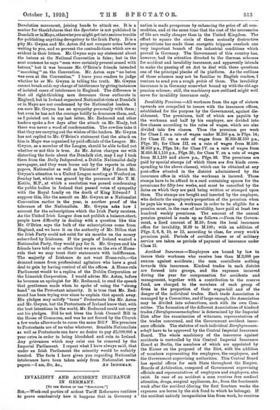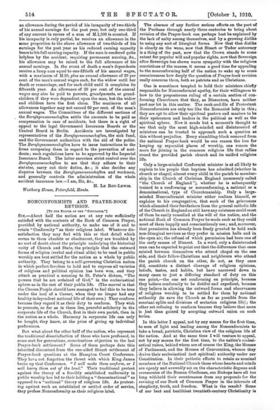INVALIDITY AND ACCIDENT INSURANCE IN GERMANY.
[To THE EDITOR OE THE " SPECTITOR..1
Sn2,—Week-end parties of ardent Tariff Reformers continue to prove conclusively how it happens that iu Germany a
nation is made prosperous by enhancing the price of all com- modities, and at the same time that the cost of the necessaries of life arc really cheaper than in the United Kingdom. The effort to square the circle of these mutually destructive propositions has made these energetic trippers overlook one very important branch of the industrial conditions which prevail in Germany. The Government of this country has, however, had its attention directed to the German schemes for accident and invalidity insurance, and apparently intends to make the passing of an Act to deal with these questions one of the principal planks of its platform. As the outlines of these schemes may not be familiar to English readers, I venture to send you a rough precis of them. The invalidity insurance is in Germany somewhat bound up with the old-age pension scheme ; still, the machinery now outlined might well serve for invalidity insurance only.
Invalidity Pensions.—All workmen from the age of sixteen upwards are compelled to insure with the insurance offices, established for the purpose by the Government, against dis- ablement. The premiums, half of which are payable by the workman and half by his employer, are divided into five classes according to the rates of wages, which are also divided into five classes. Thus the premium per week for Class I. on a rate of wages under M.350 p.a. is Pfge. 14; for Class II. on a rate of wages from M.350-M.550 p.a., Pfge. 20; for Class III. on a rate of wages from M.550- M.850 p.a., Pfge. 24; for Class IV. on a rate of wages from M.850-31.1,150 p.a., Pfge. 30; for Class V. on a rate of wages from M.1,150 and above p.a., Pfge. 36. The premiums are paid by special stamps (of which there are five kinds corre- sponding to the above classes), which can be obtained at any post-office situated in the district administered by the insurance office in which the workman is insured. These stamps have to be affixed to a card containing spaces for the premiums for fifty-two weeks, and must be cancelled by the dates on which they are paid being written or stamped upon them. The stamps are bought and inserted by the employer, who deducts the employee's proportion of the premium when he pays his wages. A workman in order to be eligible for a pension must, in the case of invalidity, have paid at least two hundred weekly premiums. The amount of the annual pension granted is made up as follows :—Prom the Govern- ment, a fixed amount of M.50; from the local insurance office for invalidity, M.60 to M.100; with an addition of Pfge. 3, 6, 8, 10, or 12, according to class, for every week's premium paid. Periods of certified illness or of military service are taken as periods of payment of insurance under Class II.
Accident Insurance.—Employers are bound by law to insure their workmen who receive less than M.3,000 per annum against accidents ; the men contribute nothing towards this insurance. Kindred trades in each district are formed into groups, and the expenses incurred during the year for compensation for accidents and management, together with a contribution to the reserve fund, are charged to the members of each group of firms in the proportion of their wages-bill and of the danger of the individual trades. Each trade Association is managed by a Committee, and if large enough, the Association may be divided into subsections, each with its own Com- mittee. The formation of the different Associations of kindred trades (Berufsgenossenschaften) is determined by the Imperial Diet after the examination of witnesses, representatives of the trades concerned, and the Government accident insur- ance officials. The statutes of each individual Bernfsgenossen- schaft have to be approved by the Central Imperial Insurance Board. The whole machinery of the insurance against accidents is controlled by this Central Imperial Insurance Board at Berlin, the members of which are appointed by the Kaiser on the proposal of the Diet, with the addition of members representing the employers, the employees, and the Government supervising authorities. This Central Board has special offices for each State throughout the Empire. Boards of Arbitration, composed of Government supervising officials and representatives of employers and employees, also exist. In case of an accident a man receives free medical attention, drugs, surgical appliances, &c., from the fourteenth week after the accident (during the first fourteen weeks the expenses are borne by the sick fund to which he belongs). If the accident entirely incapacitates him from work, he receives an allowance during the period of his incapacity of two-thirds of his annual earnings for the past year, but only one-third of any amount in excess of a sum of bI.1,500 is counted. If his incapacity is only partial, he receives an allowance in the same proportion to the above allowance of two-thirds of his earnings for the past year as his reduced earning capacity bears to his full earning capacity. If the man is rendered quite helpless by the accident, requiring permanent nursing, &c., his allowance may be raised to the full allowance of his annual earnings. In the event of death a man's dependents receive a lump sum equal to one-fiftieth of his annual wages, with a maximum of M.50, plus an annual allowance of 20 per cent. of the man's annual wages each, for the widow until her death or remarriage, and for each child until it completes its fifteenth year. An allowance of 20 per cent. of the annual wages may also be paid to parents, grandparents, or grand- children if they were dependent upon the man, but the widow and children have the first claim. The maximum of all allowances together may not exceed 60 per cent. of the man's annual wages. The Committees of the different sections of the Berufsgenossenschaften settle the amounts to be paid as compensation in case of accidents, but there is a right of appeal to the legal Government Insurance Boards or the Central Board in Berlin. Accidents are investigated by representatives of the Berufsgenossenschaften, the sick fund, and the Government authorities with the aid of the police. The Berufsgenossenschaften have to issue instructions to the firms composing them in regard to the prevention of acci- dents; such regulations have to be approved by the Imperial Insurance Board. The latter exercises strict control over the Berufsgenossenschaften to see that they adhere to their statutes, carry out their duties, &c. ; it also decides any disputes between the Berufsgenossenschaften and workmen, and generally controls the administration of the whole accident insurance law.—I am, Sir, &c.,



























































 Previous page
Previous page